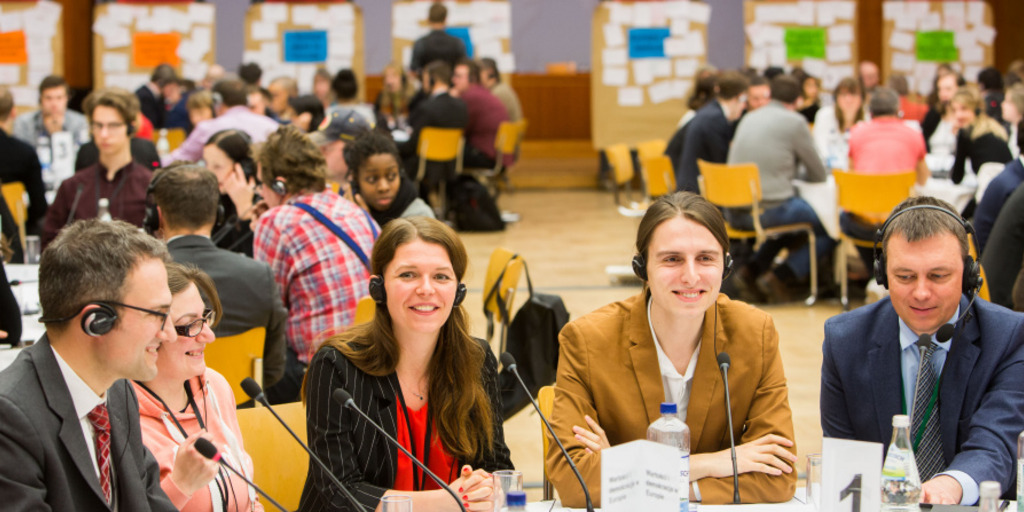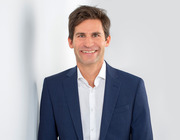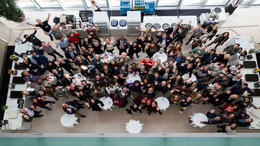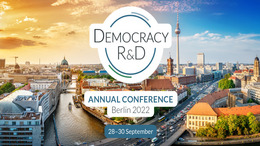Many of its citizens consider the European Union to be undemocratic, elitist and remote. Every five years there are European elections. In the ensuing time most people do not know how they can participate in EU politics. In fact, in Brussels there is no such thing as dialogue-based participation, which can help citizens to become directly involved in policymaking. The European Commission and the European Parliament tend to consult associations and political interest groups, whereas individual citizens, their interests, ideas, and enthusiasm, find it difficult to be heard.

© Sebastian Pfütze
More citizen participation within the EU
The European Union likes to see itself as a “Europe of the Citizens”. But for many it remains remote, elitist or even undemocratic. In a time when the EU needs the support of its citizens more than ever, it is vital to develop new ideas and strategies for participation. A conversation with our experts Dominik Hierlemann and Anna Renkamp.
Why is the EU actually in need of more citizen participation?
Can you identify any positive developments in Brussels?
Yes, absolutely. In recent years, the European Commission conducted more Citizen Dialogues than ever before. It is testing new approaches, trying to involve people who would be otherwise unlikely to participate. A change of mentality is already taking place among some politicians and bureaucrats. More and more decision-makers are becoming aware that we need to involve people in a different way than before. But it is also clear that there is still not enough openness and willingness to take risks to try out something really new.
How does modern citizen participation on a transnational level work?
First of all: new approaches do not replace elected members of parliament and are not an alternative to the European Parliament. On the contrary, they try to strengthen existing institutions by involving citizens in politics in a different way. For example, randomly selected citizens can be invited to develop a common position on European issues. Political exchange must also take place between citizens of different countries. We have undertaken several projects on this with the European Commission and with the German Federal Foreign Office.
Can you provide an example?
With the Federal Foreign Office we conducted a transnational citizens' dialogue with German, Polish and French citizens. Innovative elements included the random selection of participants, interactive methods and new interpreting techniques. Our evaluations show: Compared to population surveys, transnational citizen dialogues are a real added value for the EU. For citizens, this form of participation increases their understanding of Europe and European politics. Politicians learn first-hand what is collectively important to citizens from several countries.
What are you doing in your project? What are you aiming at?
In cooperation with European institutions, we show examples of what effective and digital citizen participation can look like. This happens in citizen dialogues and citizen workshops. We also bring together European politicians, experts and practitioners and consider together how European democracy can - and must - develop further. The EU will only survive if Europeans recognize it as democratically legitimate.
Is there anything the EU can learn from its member states?
In any case: In more and more countries citizens are directly involved in the development of political content and in decisions. Ireland has changed its constitution after an assembly of 100 randomly selected citizens drafted a proposal. French President Emmanuel Macron convened a so-called Citizens' Convention, which drew up proposals for dealing with and mitigating climate change. There will be a referendum on this. And the German Bundestag wants to hold the first ever randomly selected citizens' council, discussing Germany's role in the world. All this shows: Representative democracy is evolving.
The EU has announced a so called "Conference on the Future of Europe". What is it all about? Will it have an impact?
The European institutions - i.e. Parliament, Council and Commission - want to hold this conference. It should last two years, involving all EU institutions and above all European citizens in an unprecedented way. Thematically, it will be built around the key issues of Europe's future - climate change, digital future, social cohesion, Europe's role in the world. Not everything is clear yet. But one thing is: it will feature new forms of citizen participation. Citizens will be involved online and in transnational groups. We have developed concrete proposals how this can happen (EINWURF 04.2019 Conference Talk). In addition, the European institutional architecture will be examined more closely. The EU cannot afford to stand still on this issue either.
Dominik Hierlemann and Anna Renkamp are heading the project “Democracy and Participation in Europe”



![[Translate to English:] Menschen diskutieren beim Bürgerdialog](/fileadmin/files/_processed_/b/e/csm_1045556754Europawerkstatt-9302_1069ead8ad.jpg)


